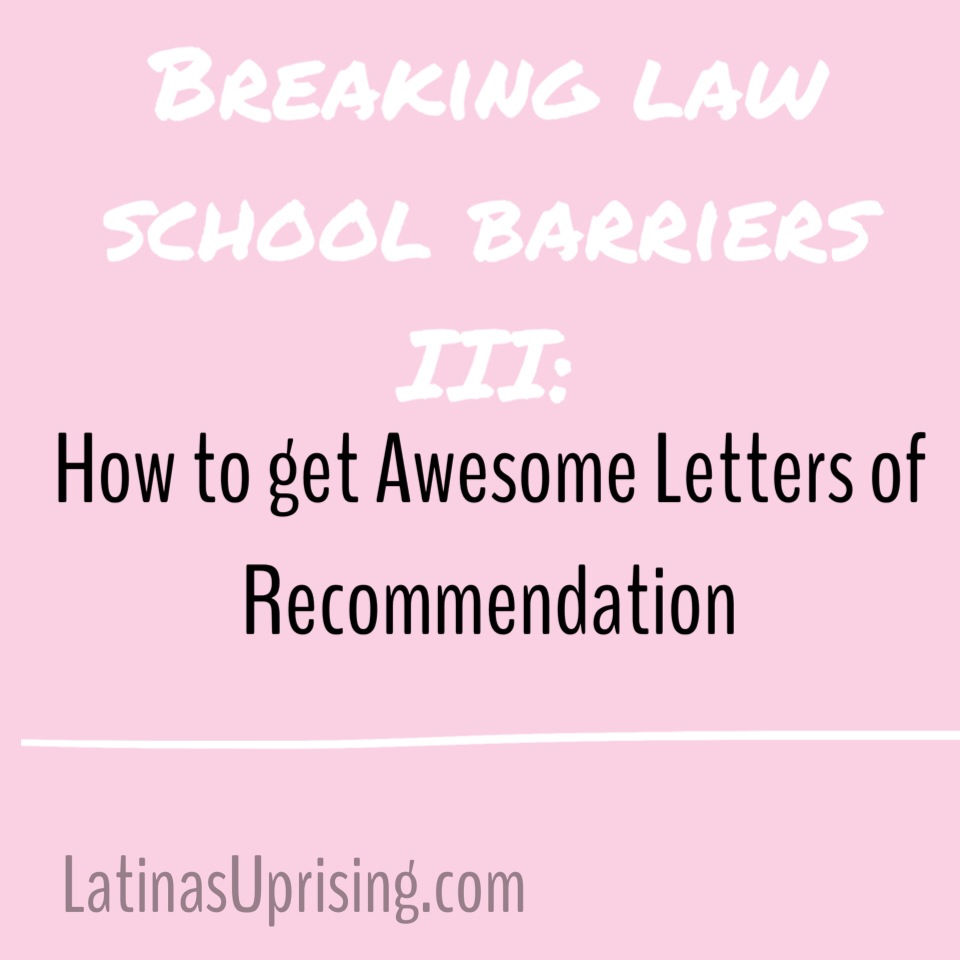Breaking Law School Barriers III: Letters of Recommendations
This series, Breaking Law School Barriers, tackles the big and small issues that come into play when you’re deciding if you’ll even attend law school. The purpose is to give practical advice for college students, and for current law students and attorneys to give suggestions about their real world experience.

Today we want to discuss letters of recommendations (LORs) for your application. It can be awkward asking for a letter, but if you build solid relationships with your professors and advisors, you’ll have a better chance of obtaining solid letters that will help get you admitted. Most schools require at least two, and generally want it from a professor, not lawyer.
That part always confused me–like, why wouldn’t they want to hear from other attorneys? But the objective of LORs is not to show that you will be a good attorney, rather that you will be a good student. Thus, knowing that law schools will give more weight to LORs from professors than attorneys, it’s important that you plan ahead so that you have a handful of teachers you can approach for this favor.
The first thing you should start doing (assuming you’re in college), is to start immediately cultivating relationships! You need to show your professors that you’re well-rounded and that goes beyond good grades. This means that you participate in class discussion; follow-up with genuine questions after class (but be mindful of their time); produce good work for them so that they know you take their class seriously; and finally, keep in touch once the semester is finished. You can stay in contact by taking more than one class with the professor so that they can see your growth from year to year. If that’s not possible, attend functions sponsored by that department so that you can interact in different arenas.
Once a professor has agreed to write a letter, you should absolutely review it prior to submitting it with your application. The fear here isn’t that the LOR will be filled with negative information (that would be, like, super rare), rather that it will be extremely vanilla. A vanilla LOR will just give basic info about you being a good student; maybe have generalities about potential or something like that. This type of letter may be done just because the professor hates writing LORs; or they have some personal issues that make it difficult for them to also add LORs to their to-do lists; or it could be that this was just the best and nicest thing a professor could describe. If that’s the case, I’d really question whether to use this type of letter and perhaps would seek out another person (even if it’s not a professor) that would write something more sparkling.
I had this happen, sort of, when I was applying for law school. I approached a professor to ask for a LOR and he was very honest in saying that he didn’t like writing them; that would prefer I ask someone else, but he would do it if I really needed it. At that time, it stung because I had taken a lot of classes with this prof and we had a cordial relationship so I was really taken aback. Now, however, I’m grateful he was honest because if I had asked him to do it anyway, it would have been bland and not very persuasive. Instead, I moved on and got a letter from another person that I had not really originally considered, and this person wrote a glowing LOR (and I’m still so thankful for that!). So make sure you review your letters and only submit the LORs that speak highly of you.
It’s also very important that you don’t abuse their generosity. You have to make your requests sparingly (so if you only need two letters for your applications– two letters is enough) because needing LORs don’t end after you submit your application. You may need them to get off waitlists, for fellowship interviews, for summer job interviews once you start law school, etc. Eventually you won’t need your college professor LORs, but you may need them beyond law school applications, and if that’s the case, you don’t want to approach a professor for the fourth time asking for yet another letter (I would say the only exception to this is a mentor).
Finally, be gracious and THANK your LORs writers! Send thank you emails promptly, but hand written is probably better in these types of situation. Follow up once you start law school to thank them again!

2 Comments
Mirna
Great suggestions, thank you! I graduate this year but I will take time off to study for LSATs and I have not figured out when the best time to ask for a LOR from a professor. Should I do it before I graduate or during the time I start my application process? (Which will be 6 months post graduation). I don’t know if having a letter dated 6 months earlier would be something that would work against me. Please advise.
latinasuprising
Mirna, I’d recommend getting the letters now even if you submit them a year+ from now. The reason is that prior to graduation, it will be easier to make contact and communicate with your professors, and they’ll have a fresh recollection of you as a student as opposed to having to remember you after time has passed. I don’t think law schools will mind if the letter has an old date, especially if you’re taking time off before starting school. Good luck!